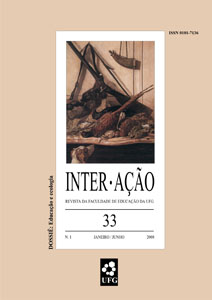Educação Ecológica e a fenomenologia da natureza de Goethe e Steiner na Pedagogia Waldorf: a ExPeriência e estética no desenvolvimento da Percepção Ecológica
DOI :
https://doi.org/10.5216/ia.v33i1.4245Résumé
A fenomenologia da natureza de Goethe é a própria essência do pensamento sistêmico que Rudolf Steiner sistematizou na teoria da Pedagogia Waldorf. Este artigo aborda a aplicação prática da fenomenologia da natureza na experiência estética da sala de aula Waldorf, como objetivo para uma educação e percepção ecológica. A imagem recebe tratamento focal como elemento básico da experiência estética e sua repercussão no desenvolvimento da percepção ecológica infantil. O artigo apresenta o fundamento teórico do fenômeno da vida vegetal baseado na metamorfose das plantas de Goethe e nas concepções de Steiner que estruturam a antroposofia, e sua aplicação prática no segundo ano do ensino fundamental da Pedagogia Waldorf.Téléchargements
Téléchargements
Publié-e
Comment citer
Numéro
Rubrique
Licence
A Inter-Ação utiliza como base para transferência de direitos a licença Creative Commons Attribution 4.0 para periódicos de acesso aberto (Open Archives Iniciative - OAI). Por acesso aberto entende-se a disponibilização gratuita na Internet, para que os usuários possam ler, baixar, copiar, distribuir, imprimir, pesquisar ou referenciar o texto integral dos documentos, processá-los para indexação, utilizá-los como dados de entrada de programas para softwares, ou usá-los para qualquer outro propósito legal, sem barreira financeira, legal ou técnica.
Autores que publicam neste periódico concordam com os seguintes termos:
1) Autores mantém os direitos autorais e concedem à revista o direito de primeira publicação, com o trabalho simultaneamente licenciado sob a Licença Creative Commons Attribution que permite o compartilhamento do trabalho com reconhecimento da autoria e publicação inicial nesta revista.
2) Autores têm autorização para assumir contratos adicionais separadamente, para distribuição não-exclusiva da versão do trabalho publicada nesta revista (ex.: publicar em repositório institucional ou como capítulo de livro), com reconhecimento de autoria e publicação inicial nesta revista.
3) Autores têm permissão e são estimulados a publicar e distribuir seu trabalho online (ex.: em repositórios institucionais ou na sua página pessoal) a qualquer ponto antes ou durante o processo editorial, já que isso pode gerar alterações produtivas, bem como aumentar o impacto e a citação do trabalho publicado.















